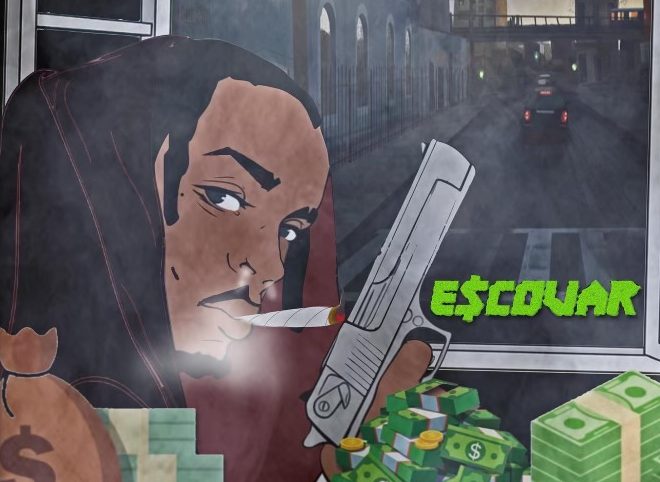
In a world where the rap game often feels like it’s playing it safe, Escovar stands out, not just because of his gritty past or his self-produced beats, but because he’s on a mission—to save Hip Hop. Born LeVar Shelden Dale on June 6, 1984, and raised in the heart of the Bronx, Escovar embodies the raw spirit of the streets that birthed the culture. He’s not just another rapper; he’s a storyteller, a beat maker, and a visionary with a message that’s loud and clear: rap isn’t dead—it just needs a revival.
Escovar’s journey into music was never just about making hits—it was about survival. Raised in the Bronx but with roots that stretched down to Orlando, Florida, Escovar’s early life was a blend of Hip Hop and hustle. Growing up around legendary names like The 45 King and MC Sha Rock, music was always in his blood. But it wasn’t just the sounds of the Bronx that shaped him—it was the struggles and losses, including the tragic death of his father, that gave his music a realness you can’t fake.
Starting out as King Varciti with the group The Hoodstarz, Escovar got his first taste of the industry in the early 2000s. But it was his foray into the New York Drill sound—long before it was popularized by artists like Pop Smoke—that set him apart. Escovar wasn’t just following trends; he was setting them, blending trap lyrics with UK Drill beats as early as 2009. The result was a sound that was fresh, raw, and distinctly his own.
Ask Escovar about his ideal recording setup, and he’ll tell you it’s right where he feels most at home—his bedroom. No fancy studio, no big-name producers—just Escovar, his mic, and his endless flows. “This is definitely where the magic happens,” he says, capturing the DIY spirit that defines his approach. He records, produces, and even directs his own music videos, including the eye-catching visuals for “Trapper of the Year,” shot entirely on an iPhone 13.
For Escovar, the vibe isn’t just about the setting; it’s about the energy. “The vibe was darkness and hell raising,” he recalls about the making of “Trapper of the Year.” The song is a high-octane tribute to his past, a time when he was one of the biggest trappers on the East Coast. With standout bars like “Trappin ain’t dead cause it’s fiends everywhere they stop and stare I’m the trapper of the year…,” it’s clear Escovar isn’t just reminiscing—he’s reclaiming his throne.
Escovar’s music is more than beats and bars; it’s a call to action. “I feel like nobody is making rap music anymore. Most so-called rappers are going with what’s safe and what sells,” he laments. For Escovar, it’s not just about fitting in; it’s about standing out. His witty punchlines, metaphors, and endless flows are a reminder of rap’s golden age, when lyricism was king and every verse told a story.
He’s not afraid to take risks, and that’s what makes his music resonate. With four albums and two beat tapes under his belt, all self-produced and available on major platforms, Escovar is proving that you don’t need a big label to make big moves. And with plans to produce hits for a major female artist, he’s not just looking to make his mark—he’s aiming to redefine the game.
To the new wave of aspiring rappers, Escovar has some straightforward advice: “Learn to record yourself. There’s free courses on YouTube to learn everything you need to know. Invest in a small studio and find your vibe.” It’s practical, no-nonsense guidance from someone who’s been there, done that, and is still doing it all on his own terms.
Escovar’s story isn’t just one of music—it’s a testament to resilience, creativity, and the relentless pursuit of a dream. From his early days in The Hoodstarz to his rise as a solo artist and producer, Escovar is carving out a lane that’s all his own. As he continues to drop new music and push the boundaries of what rap can be, one thing is clear: Escovar isn’t just here to play the game—he’s here to change it.
